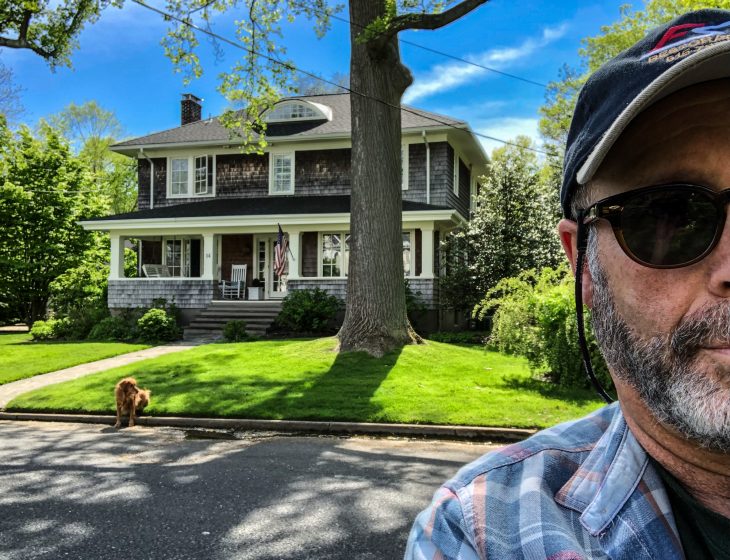I went back to Rumson for a few hours last week….
Rumson is the town near the Jersey Shore where I was a kid.My family lived there from 1950 until 1962 – from age 0 to age 11. My childhood, pretty much.
Over the decades since, I’ve gone back there several times.In the fall of 1984 I went back for two whole weeks.I owned a house in Hawaii at the time, and could have arranged a ‘vacation home exchange’ anywhere in the world. I could have gone to England or France; I chose instead to spend two weeks in New Jersey.But even that was not enough to heal the psychic wounds inflicted by the way I’d left 22 years earlier.
Prior to this most recent visit, the last time I was there was in 2002, when my sister and my brother and his wife and a couple of their kids and I granted our mother’s final wish and spread her ashes around the town where she’d spent the happiest years of her life – before our father’s untimely demise in 1958.
Today I am publishing a pair of companion pieces that explore my departure from Rumson in 1962 – and why I keep going back:
The Summer of ’62 is about the move.It’s a piece that I wrote as part of a memoir writing class I took in March of this year.
Return to Brigadoon is about one of those return visits in the summer of 1969; it’s based on a poem I found when I re-opened the journals I kept during my last year of high school and first year in college.
I’m posting these now as part of an attempt to find meaningful closure around some of what my new therapist calls “early childhood trauma.”
For the past 8 months, I have been working with Lee Norton, a therapist in Nashville who specializes in the full spectrum of trauma, from assault-rifle-massacre-survival to the sort of catastrophic early losses like I suffered when Harvey died. I’ve been in-and-out of therapy since I was in the third grade but this feels like the most productive therapeutic work I’ve ever done. Please don’t ask me why it took so long.
 I’m not sure what the outcome of this current course is supposed to be. My 67-year-old-self has been spending a lot of time with my 7-year-old self, who, it seems, went into hiding about the time his father died. The kid and I are still deliberating over who liberates who.
I’m not sure what the outcome of this current course is supposed to be. My 67-year-old-self has been spending a lot of time with my 7-year-old self, who, it seems, went into hiding about the time his father died. The kid and I are still deliberating over who liberates who.
And while I’ve been doing that work, I’ve been spending some (but not nearly enough) time rummaging through my father’s writing and the correspondence he and my mother exchanged during World War II.There seems to be a connection.
I know what some of you are thinking: Why doesn’t he just get over it?His father died, the family moved, yada yada. It was 60 years ago.Move along…
I’ve even heard the word “indulgent” to describe these nostalgic disquisitions.
Yes, I am deeply conflicted about the whole proposition.On the one hand, it feels like necessary and unfinished work, despite the half-dozen decades between me and the events I keep returning to.On the other hand, at times the whole exercise seems like an excuse for not moving on to more constructive pursuits.
All of this came up in a session I had with Lee Norton shortly after this last visit to my point of origin. After wondering why am the only one of three siblings that continues to be affected by these long ago events, Lee offered:
One kid tends to get hit more than the others. Regardless of what the catastrophic loss was, the usual defense mechanisms are overwhelmed. It’s a very physiological process. The brain doesn’t have anywhere to put it, so it accumulates and sequesters in the right hemisphere which has no sense of time.
The brain always wants one linear, explicit storyline that it can then put away. Until you look into a catastrophic event and do something …. the brain does not recognize it as finished and when it’s not finished then all these unconscious processes kick in and we recapitulate. We’ll have relationship or job dilemmas; it’ll show up in lots of different ways – financially, self medication (umm…that would be me). The goal is you have to get it finished...
So I am, once again trying to get it finished.
For you, reading these things is optional.For me, apparently, writing them is not.
*

A 180º panorama of Monmouth Avenue. It was a great neighborhood for kids and bicycles.
No helmets required.
*
*

